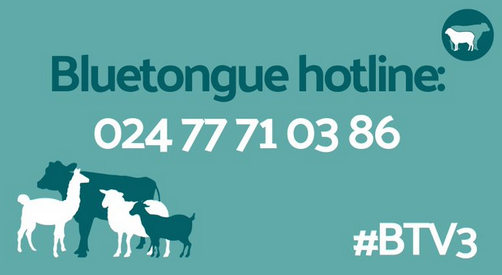Bluetongue Information
Bluetongue, Disease information
https://ruminanthw.org.uk/bluetongue-virus-information-for-vets/battlebluetongue-vet-information/
Bluetongue (BTV) is a viral disease transmitted by biting midges, which affects all ruminants (e.g. sheep, cattle, goats and deer) and camelids (e.g. llama and alpaca).
BTV-3 announcement
We are now also allowed to share images of the BTV3 clinical signs from cases confirmed in England. More images will be added as they become available: LINK TO IMAGES
Following confirmation of BTV-3 on a number of new premises in Suffolk and continued evidence of local transmission of bluetongue virus, and in accordance with the bluetongue disease control framework, the Restricted Zone and Infected Area has been extended to cover Essex. It now covers the counties of Norfolk, Suffolk and Essex.
Following reports of clinical suspicion in sheep and cattle on 3 new premises in Norfolk and Suffolk, bluetongue serotype 3 (BTV-3) has been confirmed at these premises. The total number of cases of bluetongue virus BTV- 3 stands at 13 infected premises. Disease has been confirmed in 41 animals. Movement restrictions apply to all ruminants and camelids moving out of the zone and to the movement of their germinal products within the zone. Farmers are urged to only move animals within the extended zone where this is absolutely necessary.
Watch the recent webinar from 20th November 2024
Watch the recent webinar from 23rd October 2024
Watch the recent webinar from 16th October 2024
Watch the recent webinar from 9th October 2024
Watch the recent webinar from 2nd October 2024
Watch the recent webinar from 25th September 2024
Watch the recent webinar from 18th September 2024
Watch the recent webinar from 11th September 2024
Watch the recent webinar from 4th September 2024
Update 31 August 2024
The Temporary Control Zones (TCZs) in Norfolk and Suffolk have been revoked and are replaced by a larger restricted zone (RZ).
The RZ covers the counties of Norfolk and Suffolk.
Farms that have any land within the restricted zone or straddle the boundary are classified as being within the restricted zone
In the RZ, more movement of animals is likely to risk causing more spread of the virus.
Farmers are advised to consider if the move is really necessary and if not, please do not move.
- Read more and view all the recent BTV-3 updates here: Latest bluetongue announcement
- A current list of designated abattoirs is available here.
- Following active surveillance in the north-east Kent temporary control zone (TCZ), one further case of bluetongue in sheep has been identified on a premises near Aylesham in the existing TCZ.
The positive animal will be humanely culled to minimise the risk of onward transmission. The TCZ is not being extended and movement restrictions continue to apply to cattle, sheep, deer, camelids and other ruminants in the zone.
- Check if you’re in a zone on the bluetongue disease control zone map.
- Legislation is now in place around movement of animals into and out of the temporary control zone.
- For up to date information on the location of the control zones visit the Defra website here.
- A current list of designated abattoirs is now available here.
What is bluetongue?
Bluetongue (BTV) is a viral disease transmitted by biting midges, which affects all ruminants (e.g. sheep, cattle, goats and deer) and camelids (e.g. llama and alpaca).
The latest strain, BTV-3 appear to mimic BTV-8 in its behaviour, however the existing BTV-8 serotype vaccine will not offer cross protection against this new strain.
Bluetongue is a notifiable animal disease. If you suspect it you must report it immediately by calling the Defra Rural Services Helpline on 03000 200 301. In Wales, contact 0300 303 8268. In Scotland, contact your local Field Services Office. Failure to do so is an offence.
Additional Resources
- RH&W – Bluetongue updates by date
- NSA – Sheep farmers warned to remain vigilant amid first Bluetongue case in sheep
- DAERA – Vigilance urged following confirmation of single case of Bluetongue in Kent – 11/11/23
- DEFRA – How to spot and report the disease
- DAERA – Bluetongue
- World Organisation for Animal Health –Bluetongue
- GOV.WALES – Bluetongue
- AHDB – Bluetongue outbreak in the Netherlands
- NFU – Bluetongue – the latest info and updates
- NADIS – Bluetongue in cattle and sheep
- GOV.SCOTLAND – Bluetongue (not updated)

